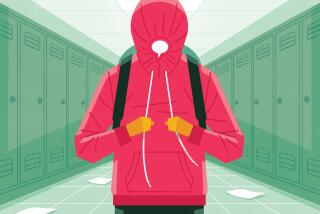How to foster compassion in children
Are the ideas on offer to reform America’s schools really the best we can come up with?
Texas has embraced reforms, for example, that call for increasing the number of charter schools and eliminating some of the exams required to graduate from high school, including one in world history. Iowa Gov. Terry Branstad just signed an education reform bill allowing parents who home school their kids to teach driver’s education. And 30 state legislatures have introduced bills authorizing some K-12 teachers to carry loaded guns to school.
But nobody seems to be talking about reforms addressing what President Obama, in a 2006 speech, called an “empathy deficit.”
Research suggests that there is such a deficit and that it is rising. In a review of 72 studies of American college students, University of Michigan psychologist Sara Konrath and her co-researchers compared students enrolled in the years from l979 to 2009. The 2009 students, they discovered, were 40% less likely to agree with the statements “I sometimes try to understand my friends better by imagining how things look from their perspective” and “I often have tender, concerned feelings for people less fortunate than me.” Over the same three decades, other researchers have found a growing proportion of college students who agree with the statement, “I will never be satisfied until I get all that I deserve,” and who feel they show “leadership ability.”
So what can we do about this apparent down-scaling of empathy?
We often assume that children are innately selfish and have to learn compassion. But at the core of each child is a capacity for empathy that can serve as a starting point. Psychologists have documented spontaneous helping behavior in 2-year-olds. And children seem able to identify with gerbils, cats and storybook waifs, creatures quite unlike themselves. But sadly, according to one study, children become less generous toward others as they grow older. So empathy can be learned and unlearned.
And there are things schools can do to teach it. Take Kids for Peace, an organization founded in 2006 by Jill McManigal, a former elementary school teacher, and Danielle Gram, who was then a high school student. The program teaches children about other cultures and then connects each American child with a child living in another country through such things as sending a hand-painted knapsack filled with school supplies, a toy and a personal note.
In Canada, child advocate Mary Gordon established Roots of Empathy, a nonprofit aimed at students in kindergarten through eighth grade. The program, now up and running at 12 sites in Canada and three in the United States, brings in a parent and baby to visit classrooms over nine months, and a trained empathy instructor helps children figure out what a baby is feeling from watching its face and body. According to the scientific director of Healthy Child Manitoba in Canada, the program reduced the probability of its participants getting into fights from 15% to 8%.
More profound still is the power of an inspiring personal example. American children are immersed in a pop culture that encourages them to emulate the rich and famous. But what if kids were introduced to heroes and heroines who model empathy and compassion? There are so many of them.
One starting point would be Paul Farmer, the visionary doctor who started Partners in Health. The subject of Tracy Kidder’s bestselling “Mountains Beyond Mountains,” Farmer grew up in rural Florida in a repurposed school bus with his parents, five siblings and a disabled uncle. But he earned a scholarship to Duke University, then to Harvard Medical School, and could have aimed straight up the social class ladder without looking back.
A visit to Haiti as an undergraduate at Duke changed all that. Farmer was struck on that trip by the enormous chasm between his bright future and the bleak prospects of so many bright-eyed, ragged Haitian children. The encounter led him not only to empathize with poor Haitians but to devote his life to creating state-of-the-art medical clinics in Haiti, Rwanda and elsewhere (largely powered by solar energy).
Educators talk about catching up to the Finns and the South Koreans, raising standardized test scores and mastering the three Rs. Meanwhile, we’ve raised our children’s self-esteem and increased their sense that they deserve things and their desire to lead.
But where will they lead us without empathy? Talk of empathy can be naive and misguided, of course. But thoughtful attempts to foster it in schools, and concerted efforts to expose kids to experiences that naturally foster compassion, would improve our schools and make for a better world. Bringing a little of Paul Farmer into the classroom? Now that would be real school reform.
Arlie Hochschild is the author of, among many other books, “The Outsourced Self: Intimate Life in Market Times” and “So How’s the Family? and Other Essays.”
More to Read
A cure for the common opinion
Get thought-provoking perspectives with our weekly newsletter.
You may occasionally receive promotional content from the Los Angeles Times.










